Teenage chefs cater Barnfest
It's farm to table, by way of school
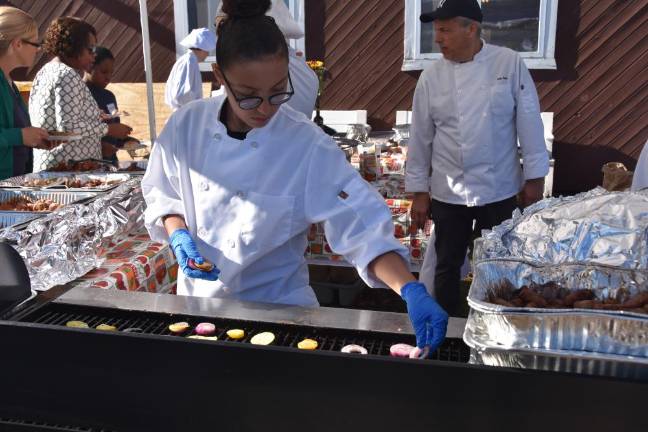
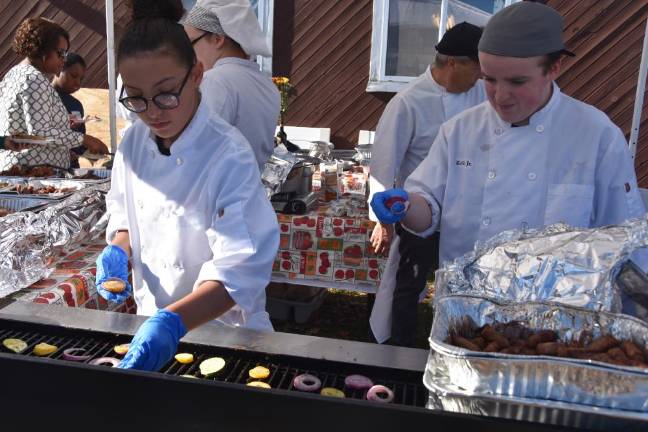

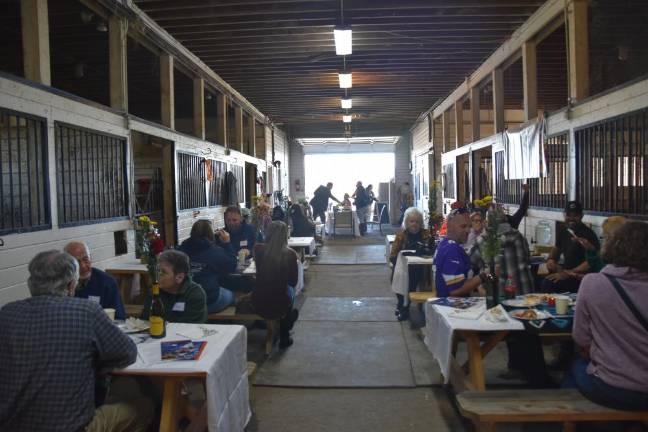
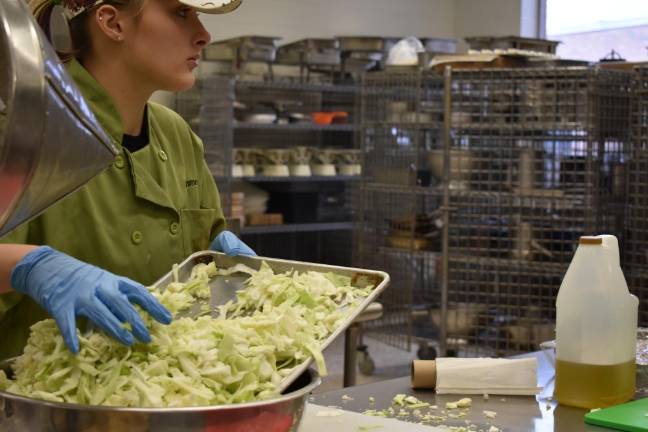
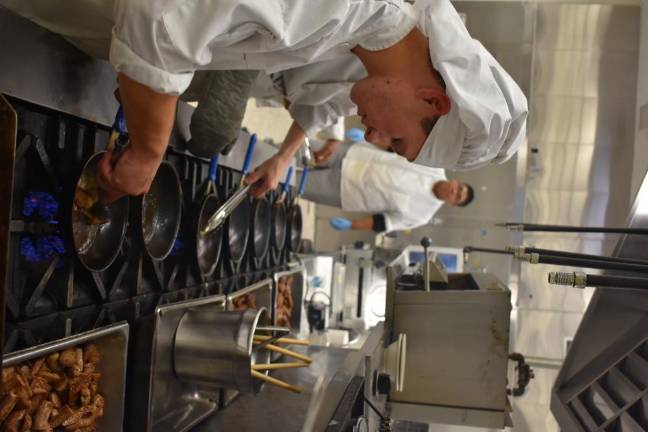
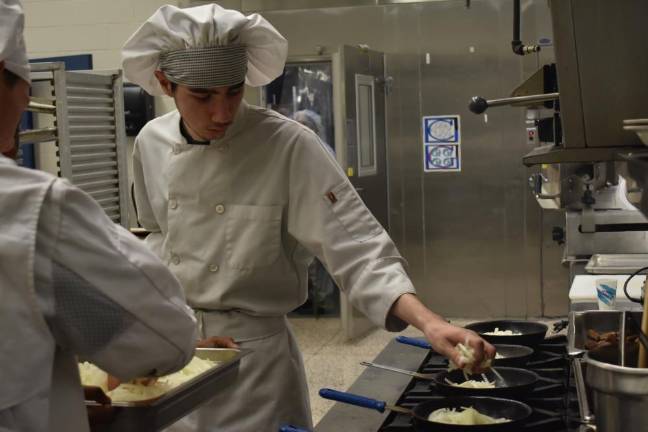
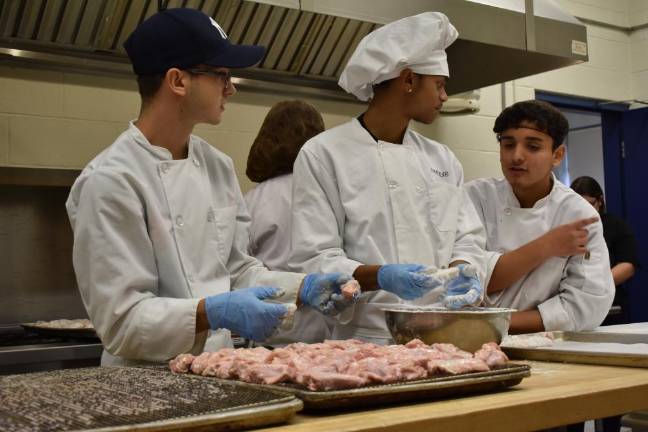
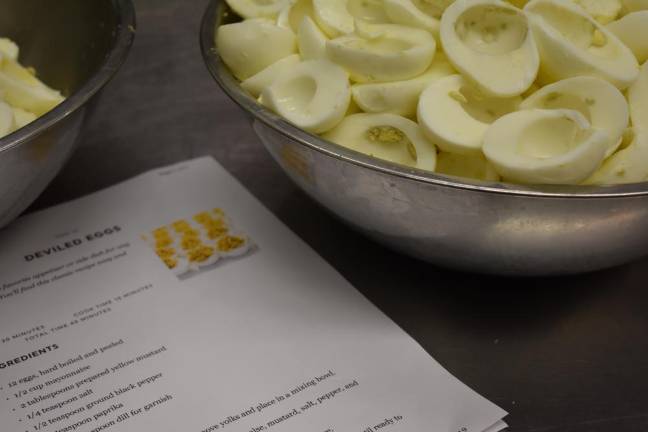
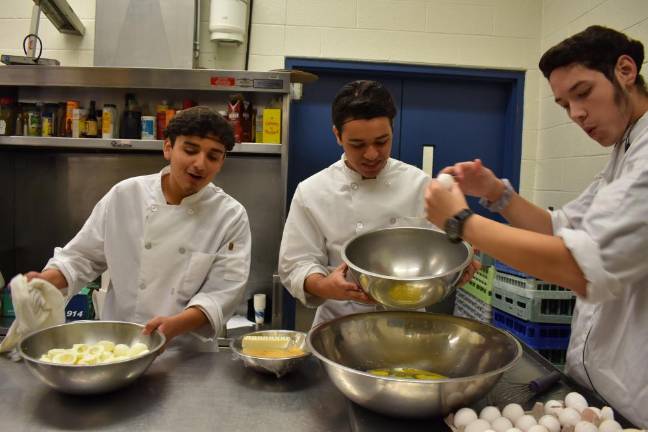
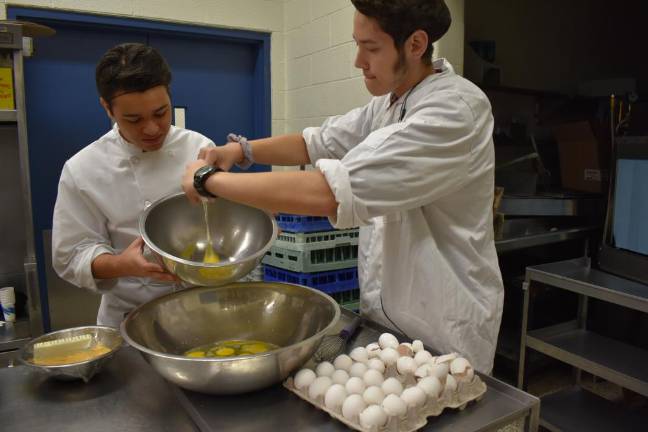
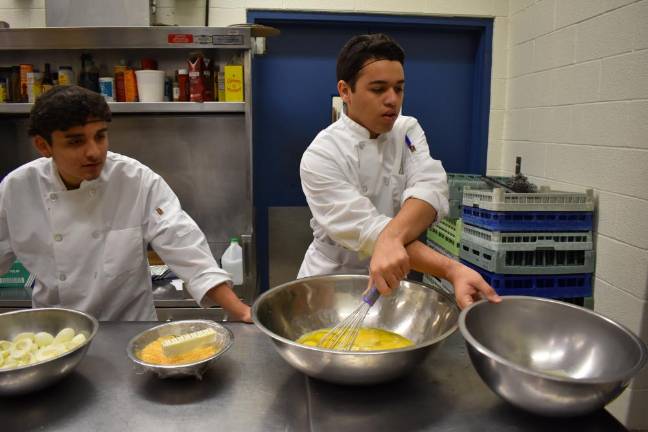
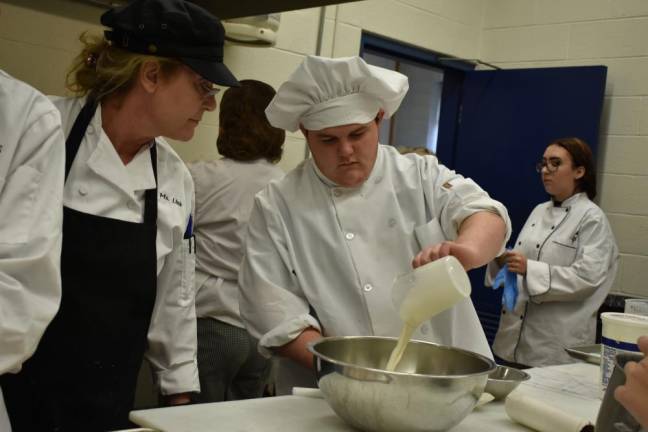
“Once you get a brown on those, then you can add in the shallots and onion,” said chef Scott Zintel to a young man in a white coat, checked chef’s pants and a backwards baseball cap. Brady Chapman, 18, straightened out of the athletic crouch that brought him level with the blue flames, wielding his tongs over two oversized pans containing wings and thighs of four ducks.
He was one of 46 students in the commercial kitchen at Orange-Ulster BOCES, all busily prepping food – chopping cabbage for cole slaw, squeezing icing onto a tray of cookies, simmering sausage in a bed of onions. Trays of hot food were shuttling back and forth, and this reporter, as she tried to snap pictures and jot notes, was doing a great job of getting in the way.
“I’ve also never cooked duck before,” Chapman confided in a low voice.
Much of this bounty, including the duck slow-cooking on the burners, comes from Banbury Cross Farm, a bucolic 120-acre farm in Goshen, four miles away from the school. And once it's been prepped, it will go back to the farm for a big party taking place the next day, Saturday. “They gave us 250 pounds of meat,” said Zintel, along with the request, “can you make this into some nice stuff?’”
Susie Cleaver, who owns and grew up on Banbury Cross Farm, was hosting her inaugural Barnfest: a big get together for friends, restaurant owners, managers and chefs, the press, “politicians, dignitaries,” as Zintel put it. Cleaver even ordered forest green zip-up jackets embroidered with the farm’s logo for staff to wear (nurse’s uniforms, she whispered, when I complimented them). And the whole thing would be catered by teenagers.
The animal science students at BOCES had been coming to Banbury Cross Farm regularly, to get hands-on experience with larger animals. Now it was time to get the culinary students into the mix. The opportunity was a win-win: Cleaver would get to showcase her meat to potential buyers, and the students would get to try their hands at dishes like pulled pork and duck cassoulet.
Cassoulet? “When you say that,” said Zintel, who was trained at the Culinary Institute of America, “the French all go ‘oooh.’”
A few students – those who didn’t have conflicting track meets or weekend jobs – would also don their chef’s whites on Saturday, gaining valuable experience prepping and serving the food at the party, maybe even getting a job out of it.
And jobs are what these kids are after. “They’re serious, going into careers,” said Zintel of the 130 students in the Orange-Ulster BOCES Culinary Food Trades program, which draws from 13 school districts. Graduates of the two-year program have gone on to work at restaurants from Stagecoach Inn in Goshen to a Napa Valley ranch to the White House, where a 2006 grad is the pastry chef. The owner of El Rancho, a Mexican restaurant in Goshen, is an alum; another is a chocolatier in Iceland.
I headed into a second commercial kitchen (there are five on campus), where another cooking class was hard at work mixing a homemade bleu cheese dressing, coating chicken wings in flour, preparing the filling for deviled eggs – and while they were at it, whipping up scrambled eggs for their breakfast.
Josh Maroles, 15, whistled as he cracked eggs, his ear buds hanging from his collar. Romin Verez, 16, started whisking with one hand, holding a bowl with the other to catch the incoming egg yolks. When you’re working with farm fresh eggs like this, Verez explained, you need to watch for blood spots.
Maroles works at Planet Pizza. Verez washes dishes at Glenmere Mansion. Did they want to become chefs? “I do,” said Maroles.
“Yeah,” said Verez. “I usually cook at home.”
If you got air-dropped into this kitchen, you'd never guess you were in a first period class. The only hint that you were not in fact in the kitchen of a busy restaraunt in the city might be the fresh-faced appearance of the chefs. Perhaps most impressive, the kitchens would be completely cleaned up by 10:30 a.m., and a new group of students would come in at 12:15.
“We always say this is the best kept secret in Orange County,” said Ellen Vanderbeck, BOCES work-based learning coordinator and my tour guide for the day. “Nothing bad has ever come out of here,” she declared. “We all taste.”
The next day, Vanderbeck was already there when I pulled into Banbury Cross Farm on the early side. The farm was spick and span. Wooden picnic tables had been arranged in long lines inside the barn. Each was topped with a Mexican blanket, a bouquet of flowers in a wine bottle and – there they were – a plate of deviled eggs, sprinkled with paprika. Guests mingled, playing lawn games and helping themselves to local wine, cider and sangria.
A dad lifted his toddler so she could sit on the fence and watch the Scottish Highland cattle grazing. The family had driven up from Brooklyn for the day, said Rebekah Ale, the mom. Her husband, who’s Australian, likes lamb, which they buy from the farm, along with pork, ground beef, eggs, chickens for soup, bacon (“because it’s not smoked, which is hard to find”). This year they also ordered a turkey for Thanksgiving.
Chloe Argueta, 15, grilled up veggies under a white tent while guests lined up to serve themselves from a meatlover’s buffet. There were restaurateurs aplenty in attendance: Jonathan Barajas, the chef-owner of El Meson De Barajas; Edison Narkaj, the manager of Limoncello’s along with the sous chef; Hacienda owner Findenzio Barajas; Palacio's manager Rico Farias. Orande Daring, BOCES’ director of career and technical education, sat at a picnic table with his wife and son.
“We got to see the animals and were able to taste the difference between farm raised animals compared to our usual supermarket purchases,” Daring said. "If Banbury decides to do this again and invites us, we would certainly welcome the opportunity to participate."
When the food line had died down, Zintel and his student Keith Grunenberg took a few minutes to walk through the barn, checking out the chickens. “That was our first time in that setting,” said Zintel. “The students had a great time and now have a better understanding of where their food actually comes from.”
As for job opportunities, there was nothing definite yet, said Vanderbeck, but there was potential at a couple restaurants. She was working on it.